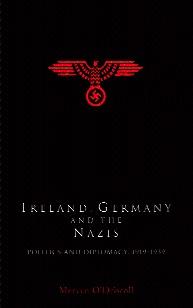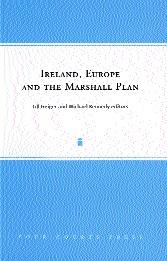Ireland, Germany and the Nazis: politics and diplomacy, 1919–1939
Published in 20th-century / Contemporary History, Book Reviews, Issue 3 (Autumn 2004), Reviews, Volume 12Ireland, Germany and the Nazis: politics and diplomacy, 1919–1939
Mervyn O’Driscoll
(Four Courts Press, £55)
ISBN 185 1 824804
Ireland, Europe and the Marshall Plan
Till Geiger and Michael Kennedy (eds.)
(Four Courts Press, £55)
ISBN 185 1 825193
 Mervyn O’Driscoll’s Ireland, Germany and the Nazis is a positive contribution to the existing corpus of literature on Irish–German relations. The author acknowledges his precursors with, however, some broad-brush reservations: ‘they tried to deal with the pre-war relationship simply as an introduction to Irish–German relations during World War II, thereby neglecting questions about Irish attitudes’. Grey areas are hinted at. The make-believe of ‘our gallant allies in Europe’ was personified in early enfant terrible Bewley. Irish Quaker, Catholic convert, diplomat, asexual Charles Bewley has been castigated for sanitising his Memoirs of a Wild Goose. O’Driscoll holds that while their usefulness as a historical source is ‘dubious’, they nevertheless provide a useful comparator for Bewley’s other attitudes and perceptions. These, however, were not readily penetrable from the draft Memoirs. Although he was a brilliant Wyckhamite scholar and a winner of the Oxford Newdigate poetry prize, Bewley’s composition in the Memoirs was sloppy and repetitious, containing longeurs and misspellings.
Mervyn O’Driscoll’s Ireland, Germany and the Nazis is a positive contribution to the existing corpus of literature on Irish–German relations. The author acknowledges his precursors with, however, some broad-brush reservations: ‘they tried to deal with the pre-war relationship simply as an introduction to Irish–German relations during World War II, thereby neglecting questions about Irish attitudes’. Grey areas are hinted at. The make-believe of ‘our gallant allies in Europe’ was personified in early enfant terrible Bewley. Irish Quaker, Catholic convert, diplomat, asexual Charles Bewley has been castigated for sanitising his Memoirs of a Wild Goose. O’Driscoll holds that while their usefulness as a historical source is ‘dubious’, they nevertheless provide a useful comparator for Bewley’s other attitudes and perceptions. These, however, were not readily penetrable from the draft Memoirs. Although he was a brilliant Wyckhamite scholar and a winner of the Oxford Newdigate poetry prize, Bewley’s composition in the Memoirs was sloppy and repetitious, containing longeurs and misspellings.
O’Driscoll devotes a lot of time to Bewley, although after the outbreak of the war he was little more than a mischievous loose cannon in Italy, regarded as an interfering nuisance by Hempel and dismissively by Woerman. Someone with a club-foot was said to be his paymaster. Goebbels was mentioned; more likely it was Veesenmayer. His private life revealed little. He played bridge with Italian princesses and discussed liturgy with the Vatican Pimpernel, Mons. O’Flaherty. O’Driscoll’s contention is that Bewley’s German tenure between 1933 and 1939 has attracted most attention.
That, however, hardly justifies the neglect of the Irish minister to Spain, Leopold Kerney, during the war years. His clandestine compromising talks with Clissman and Vessenmayer constituted the most serious threat to Irish security during the war. If British ambassador Gray had got wind of them, there is no knowing what the outcome would have been. The director of intelligence warned de Valera of the danger and vainly advised Kerney’s recall. But Kerney was an old Sinn Féin comrade of Dev’s, brought back when Fianna Fáil returned to office in 1932.
I had hoped that O’Driscoll would have thrown some light on the mysterious muzzling of the 12 September 1939 aide-mémoire on neutrality, which Michael Rynne called ‘a mini-Watergate’. De Valera knew as much as he wanted to know about Walshe’s toadying to the British on the subject. He outmanoeuvred Hempel on the matter. In fairness to Hempel, there is more to him than O’Driscoll’s cardboard cutout of the ‘old school German gentleman diplomat’. His mother, Olga Elwine Porfick, was Russian, though Eva, Hempel’s wife, daughter of a Prussian army officer, insisted, rather racially, that she was of ‘pure German stock’.
 De Valera found Hempel ‘invariably correct’, except after the fall of France when, like most Germans then, he was insufferable. O’Driscoll’s boxing him in as de Valera’s representative in Berlin, just as Bewley was Hitler’s in Dublin, is a box-car too far. As 1940 proved, Hempel was steadfastly German first and foremost: Bewley was erratically narcissistic.
De Valera found Hempel ‘invariably correct’, except after the fall of France when, like most Germans then, he was insufferable. O’Driscoll’s boxing him in as de Valera’s representative in Berlin, just as Bewley was Hitler’s in Dublin, is a box-car too far. As 1940 proved, Hempel was steadfastly German first and foremost: Bewley was erratically narcissistic.
O’Driscoll is less stereotypical about enigmatic Dan Bryan, though he could not be expected to perceive the degree to which Bryan personally influenced his British contacts towards an acceptable interpretation of neutrality. In that context, General Dan McKenna, to whom de Valera delegated the defence of the country, and whose thin-ice liaisons with British General Franklyn aided it, does not merit a mention. Neither does Vessenmayer, Ribbentrop’s agent for fomenting rebellion in Ireland (whom I met); nor pathfinder journalist Enno Stephan, who does, however, appear in the select bibliography. However, as this well-worked thesis proves, there is plenty of scope for fresh research. The span is wide.
‘It’s the economy, stupid.’ So the saying goes and all its roads lead to and from the uneasy conflux of domestic and foreign policy. Dick Spring ascribes ownership of the emergent foreign policy to the people. At first sight, Ireland, Europe and the Marshall Plan might seem not to promote Dick Spring’s people proposition. It could be accused of being written by academics for academics. The practitioners of diplomacy on the ground smile wryly at academic pretensions.
Here, however, the language is straightforward, not at all omniscient or condescending. The editors have economically marshaled (sic) matters arising from a conference on Ireland and the Marshall Plan organised by Mary Brown into thought-provoking considerations of the importance of American aid to Western Europe. The essays clash opinions and promote exchanges yet with no excess of pedantic disputatiousness.
It took a long time to realise that ‘ourselves alone’ economics had outlived their usefulness. The legacy of the posturing was revealed in 1961 when Ireland first applied to join the European Economic Community: the economy was weak, emigration was high, and per capita income was among the lowest in Western Europe. On several occasions Seán McBride made shapes of breaking the link with sterling, dangling the possibility of joining NATO for ending partition. On the other hand, it was the cost of arms procurement that deterred conservative John A. Costello from joining. McBride’s policy initiatives were launched safe in the knowledge that the British would block them. There was a precedent for this slipperiness in the Irish response to the Briand Plan in 1930: endorsing it in principle but ruling out Irish participation.
There was nothing ignoble in that. Necessity propelled Britain’s post-war pro-Americanism; its financial weakness in 1947 left it little option but to coordinate its foreign policy with that of the United States. This led to the creation of the CEEC (Committee for European Economic Cooperation), which linked Britain with Europe. Similarly, geopolitics locked Blair with Bush in Iraq; oil rules—Kyoto has not yet pinched hard enough. The economic shoe is the first to pinch.
It took the Marshall Plan, participation in the ERP (European Reconstruction Programme), Whitaker’s economic logic and Lemass’s persistence and vision to begin advancement with the Europeanisation of Irish foreign policy. Its progress was not smooth. Encrusted traditionalists saw to it that the battle between change and embedded continuity would grind on. This tussle was compounded by issues concerning the extent to which American hegemonic leadership moulded the post-war international economy. What did the Americans stand to gain, was the recurring reservation. This book expertly diagnoses and, without stridence, postulates pertinent considerations.
Its tables speak for themselves. The names there are still luminous: personalities prescribed policies; ethos affected trends. Lemass perceptively pronounced that the first change of government was largely a matter of the Christian Brothers boys taking over from the Clongowes fellows, the Clongowes Mafia. Difficult J.P. Walshe communicated with his subordinates by notes. He was wrong about Vichy: only the insight of Seán Murphy saved the country from humiliation. De Gaulle still insisted on Murphy’s purgatory.
Murphy in turn, another right-wing Clongownian, took early retirement rather than swallow the admission of Red China to the United Nations. Michael Rynne, legal advisor to the Department of External Affairs in 1945, pointed the finger at Walshe for his anxiety to ingratiate himself with the British on Irish neutrality. Walshe wished to suppress any references to it: ‘the less said about it the better’, was his subservient British attitude. However, though loathed by his staff, he is lauded by some academics. His tenure spoke for itself: external affairs had never been open to or even aware of the need for economic development. Thereby hangs the tale of Éire’s economic frigidity for a bleak, barren, over-nationalistic period.
Consequently Ireland did not benefit as it should have done from the Marshall Plan. It did not join the EFTA (European Free Trade Association). The NATO umbrella was another matter. In 1948, when Russian armour had the capability to penetrate to the Channel coast, myopia was preferred. A declaration of neutrality was deemed to provide sufficient protection. The lesson of Denmark and the Low Countries in World War II was not heeded. All those policies had economic consequences. Interdependence, integration and multi-lateralism became pejorative terms. Emigration provided a temporary palliative. Continuity was preferred to change. It took direct foreign investment to provide the jolt and the jobs that led to the Celtic Tiger.
Michael Kennedy concludes with an extensive review, guiding students through the sources on the Marshall Plan in the National Archives of Ireland to tips on how to avoid pitfalls. He directs his remarks to postgraduates. That should not put off the lay researcher who is comparing and contrasting reckonings and out-turns. The displacement of McElligot’s clogged conservatism by Whitaker’s forward-going contributions provided a providential catapult. Ireland and Europe owe an abiding debt to Marshall and the United States. There is plenty of food for thought in this book, which inevitably boils down to bread-and-butter issues and ‘what ifs’.
J.P. Duggan
















